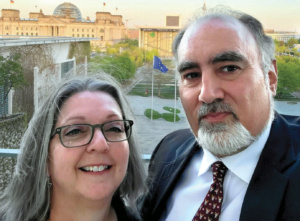Before You Say “I Do!”:
Benefits Of Premarital Counseling
Article by | Peggy & Robert Holzweiss
Every couple wants a perfect wedding day, and a lot of time and effort goes into planning a special celebration with family and friends. But what about the day after the wedding? Are you spending the same amount of time and effort planning for married life after the celebration ends?
Building a strong foundation now will help you successfully work through the surprises and challenges of your life together.
Many of our expectations about living life come from our family of origin. We spend many years being shaped by our families. Their beliefs, behaviors, and traditions become ours, and we bring all those things with us into a marriage. These deeply engrained expectations can become obstacles with our spouse unless we identify, discuss, and negotiate them together.
Let’s consider three examples of how differing expectations could cause problems within a marriage. The first example is the mundane business of life. Grocery shopping, cooking meals, cleaning the house, and mowing the lawn are common tasks in any household. In some households, though, children are not asked to perform any tasks beyond keeping their rooms clean. If your future spouse comes from such a household, they may walk right past the dishes in the sink and not even notice them. This may lead to spoken or unspoken resentment when you are the only one who handles the dishes. Instead of waiting for the resentments to emerge, plan ahead by discussing how each of your families handled household chores and creating your own division of labor as a married couple.
A related example is handling financial matters. Finances are a common source of arguments for newly married couples because there are different expectations about who manages the money, how money is spent, and how to save for big purchases. Consider a scenario where your spouse is managing the budget and paying bills every month; all spending is now seen and evaluated by your spouse. If you are trying to build a savings account, a daily coffee purchase could become a source of tension unless you both agree that it is an approved expense. Also think about gift giving in this scenario. If you want to purchase a gift for your spouse, it will show up on the credit card bill or in the checking account. Your spouse will see what you spent and where the gift came from. If gifts should be a secret in your household, it is important to discuss how you will handle this issue. Even if one spouse is managing the finances, both of you need to be involved in financial decisions. A practical way to begin the conversation is to discuss individual spending limits that do not require spousal approval and whether you should each receive a cash allowance to spend as you wish.
 Special occasions can also come with differing expectations. For instance, Thanksgiving is a time for many families to gather. If both you and your spouse want to spend the holiday with your respective families, a conflict emerges. It is important to discuss all holidays and special occasions before they occur and have a plan for balancing time with both families. You may decide to alternate holidays between families, alternate which years you will spend a holiday with each family, or perhaps you can start a new tradition and invite both families to visit you.
Special occasions can also come with differing expectations. For instance, Thanksgiving is a time for many families to gather. If both you and your spouse want to spend the holiday with your respective families, a conflict emerges. It is important to discuss all holidays and special occasions before they occur and have a plan for balancing time with both families. You may decide to alternate holidays between families, alternate which years you will spend a holiday with each family, or perhaps you can start a new tradition and invite both families to visit you.
These three examples offer a small glimpse into the preparation needed for a solid marriage foundation. Since you are new to marriage, preparation becomes easier if you have a guide to follow. One simple strategy is finding a book dedicated to preparing couples for marriage. A search for “marriage preparation” on any bookseller website will result in many low-cost options. These books ask each of you to answer a series of questions on a specific topic then exchange your responses. This process helps you identify shared experiences as well as differing expectations that may require more in-depth conversation. Common topics in these guided discussions include household management, finances, careers, children, family life, sexuality, and spirituality.
It may be beneficial to have someone facilitate the discussions for you such as a marriage counselor. Or, you may know a couple who has been married for many years who could become mentors as you prepare for marriage. The expertise of a counselor or married couple can help you identify potential challenges for your marriage that you may not see on your own.
If you have a faith tradition, you can also ask about marriage preparation events your church may host. Many religious organizations offer workshops and classes that you could attend together. These activities are often conducted with several other engaged couples so you can learn from each other. It can be helpful to hear what other couples are struggling with and how they resolve common issues as they plan for marriage. And the facilitators in the workshops and classes are often married couples who share their own relationship wisdom for you to consider.
Marriage preparation should begin well before your wedding day. The sooner you and your future spouse begin discussing the subjects mentioned above and many others not listed here, the stronger your foundation will be as you begin your
lives together.
 Peggy and Robert Holzweiss have been married for 24 years. They have mentored and guided engaged couples through marriage preparation at their church for many years.
Peggy and Robert Holzweiss have been married for 24 years. They have mentored and guided engaged couples through marriage preparation at their church for many years.
They are both graduates of Texas A&M University and have two children–Jakob, who is currently a senior at Texas A&M University, and Nicholas, who is a sophomore at Texas State University.
Robert is the Acting Director at the George H.W. Bush Library and Museum, and Peggy is an Associate Professor in the Department of Educational Leadership at Sam Houston State University.

